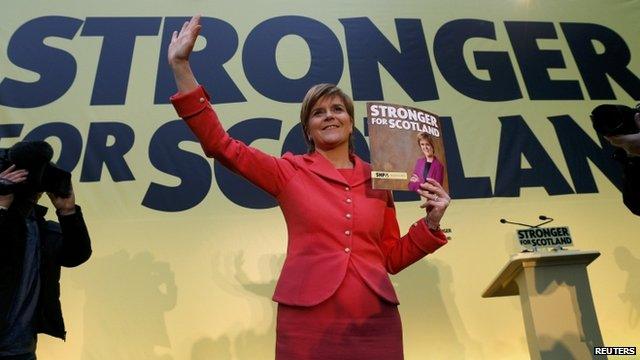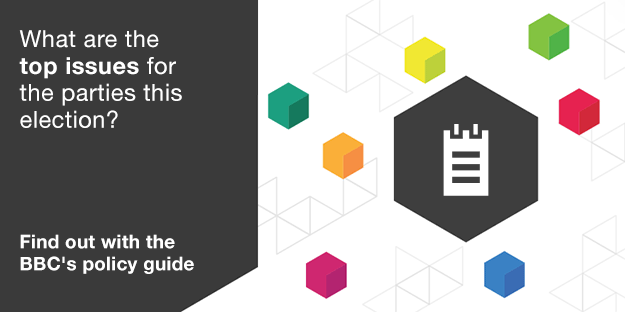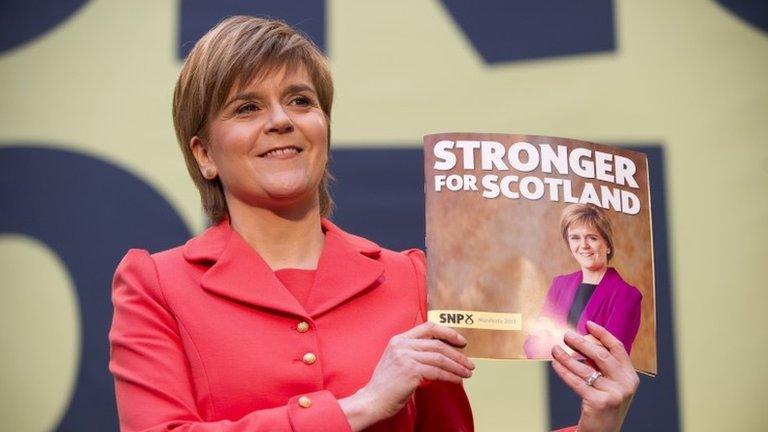Election 2015: Sturgeon's evangelical message to people of UK
- Published

Nicola Sturgeon said the SNP's manifesto was "bursting with ideas"
It would have been easy, so easy, for the SNP manifesto launch to slide towards bombast. The elements were all there.
The polls suggest a substantial lead for the Nationalists. The venue was, literally, cavernous and crowded with eager supporters - who were ready to cheer volubly at any mention of independence, Scotland or indeed Nicola Sturgeon.
Sheffield, anyone? Not a chance. After eight years in devolved government, Ms Sturgeon is nothing if not cautious. Her mood was cool, serious and controlled, with elements of self-effacing humour.
When inviting questions from the wicked media, she even cautioned her more zealous supporters against jeering if they felt a little aggrieved by the tone of the inquiries. We were, she said mildly, only doing our job.
Key priorities
SNP
Main pledges
- Spending increase of 0.5% a year, enabling £140bn extra investment
- Annual UK target of 100,000 affordable homes
- Increase in minimum wage to £8.70 by 2020
- Restore the 50p top income tax rate for those earning more than £150,000; introduce a mansion tax and a bankers' bonus tax
- Build an alliance against the renewal of Trident
- Retain the triple lock on pensions and protect the winter fuel allowance

Her job, it seems, is now to evangelise her party's offering beyond the boundaries of Scotland. She said that the SNP, if returned in sufficient numbers to hold the balance of power, would argue for progressive policies to the claimed benefit of Scotland but also the entire UK.
What lies behind this approach? Firstly, it is an extension of the offer which has, seemingly, brought the SNP to a position of potential influence.
That offer is to provide a strong voice for Scotland. To be clear, that has always been a potent message in Scotland: one which the parties of the Union have consistently sought to counter.
It has, arguably, gained further salience in the aftermath of the referendum when people are perhaps seeking assurance that Scotland's perceived interests are being addressed.
Grow independence
Secondly, the current strategy is an extension of the approach adopted at Holyrood by the SNP. Instead of seeking conflict, their declared aim has been to use devolved power to govern moderately and consensually, within the limits of devolved power.
They have then invited the voters to infer that things could be much better still if only Holyrood had greater powers. In short, they are seeking to grow independence gradually on the foundation of the existing devolved structure.
Similarly, now, at Westminster. The SNP reckon that, particularly in the aftermath of recession, voters want hard-working, serious politicians who consider their interests, not those of the party. Hence Ms Sturgeon's offer to co-operate with others, specifically with Labour.
In particular, that allows the SNP to claim that those in Scotland who favour Left-leaning social justice can safely opt for the SNP rather than Labour - because the SNP will attempt to thwart the prospect of a further Conservative government.
Thirdly, the offer to intervene in UK policy issues is designed to present potential challenges to Labour - who remain the SNP's principal rivals in Scotland.
It allows the SNP to say.....
we would reject the upgrading of Trident
we are against any further privatisation of the NHS, in England
and it invites the voters to pose the same questions to Labour.
Fourthly, this strategy is designed to remove any lingering perception that the SNP are only interested in independence. The biggest cheer today came when Ms Sturgeon stressed that the Nationalists continued to support independence.
It was swiftly followed by a reality check as the SNP leader insisted that this UK election was not about independence, not about a mandate for a further referendum, not even primarily about full fiscal autonomy.
These issues would return. But this election, according to the SNP, is about the voters' priority: tackling the economy.
The SNP calculation, presumably, is that they will gain more of a hearing from those same voters if and when they return fully to the constitutional question at a more appropriate juncture.
Nicola Sturgeon launches the SNP's general election manifesto saying it is "bursting with ideas and ambition" for all of the UK
So the SNP leadership is sincere when it says it wants to co-operate in driving progressive politics at Westminster. It is in keeping with the party's general outlook. It matches the approach adopted at Holyrood where the party has sought consensus (although Labour questions whether that consensus has always been aimed at progressive outcomes.)
But, as Ms Sturgeon reminded her enthusiastic audience, the aim of independence remains. It has not been abandoned. Merely postponed as a consequence of the referendum.
So there is a final element to the SNP strategy which resides in the reaction of The Prime Minister. He said it would be a "frightening prospect" if the SNP were to gain a share of UK power, given that they sought to end the UK.
Inflame opinion
Ms Sturgeon responded that the people of Scotland were entitled to vote as they chose - and that the SNP, if so mandated, were entitled to vote in the Commons in pursuit of that popular verdict.
Otherwise, she said, what did supporters of the Union mean when they said, during the referendum, that Scotland should lead the UK, not leave it?
But suppose that Mr Cameron persists with his argument. Is that not likely - his critics would say calculated - to inflame opinion in England against the modern manifestation of the West Lothian question?
Might that mean that the contribution of MPs from Scotland is further questioned, their role at Westminster further challenged?
For a supporter of independence, what's not to like?
- Published20 April 2015
